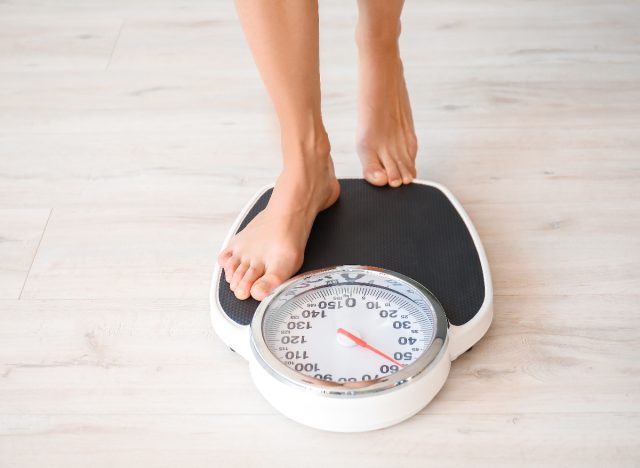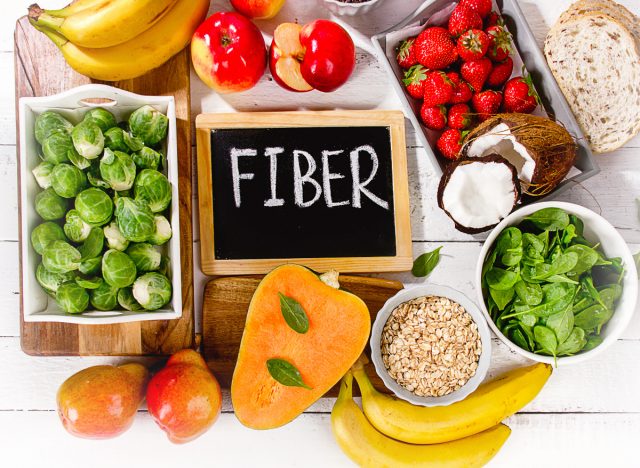Jenna Jameson Credits the Keto Diet for Recent Weight Loss

Jenna Jameson is speaking out about her recent weight loss after fans have commented on her slim physique. “I wanted to address a few things,” she said in a brief Instagram video. “I know everybody — well, not everybody but a lot of people — are addressing my weight loss,” the former adult film star, 49, said. “I’m back to keto. It makes me feel the best,” Jameson shared of the high-fat, low-carb diet that helped her lose almost 60 pounds in 2018. In addition to keto, the mom of three said she has also done a little intermittent fasting and is off all medications from a mystery illness she battled last year. A self-professed “keto queen,” Jameson credits the diet for not only losing weight, feeling happier overall. “I’m now a little under 4 months on the #ketodiet and it’s not only given me physical results, I feel happier, smarter, and much more confident,” she wrote in the post where she revealed her 57-pound weight loss. The keto diet started to gain popularity in the 90s but is considered controversial by many health experts because of long-term health risks. Here’s what to know about the keto diet and what to take into consideration according to nutrition experts.
Why the Keto Diet is Popular

Cutting carbs is something many people do when trying to reach their weight-loss goals and it can be effective, which is one reason why keto is so popular. What the Expert Says: “The nature of the keto diet naturally avoids highly processed foods and the loads of added sugars found in so many of our foods,” Melanie Murphy Richter, RD, nutritionist and instructor of Nutrition Physiology at the University of California Irvine explains. “Most people don’t realize how much these foods contribute to their fatigue, sluggishness, brain fog, and other generally frustrating daily symptoms. These types of foods also can contribute to a variety of other health conditions like diabetes, heart disease, and even certain cancers.” She adds, “After a person gets over the initial hump of removing these foods from their diet and the associated “keto flu” symptoms they are likely to experience, they often feel energized, clear-headed, and light. Yes, of course, weight loss is a big component to the popularity of the keto diet. But even more so than that, people quickly realize how good they finally feel without all of the sugar and toxins found in processed and ultra-processed foods.”
You Can Lose Weight on Keto, but Also Gain it Back

The keto diet can be restrictive initially when you completely eliminate carbs you can lose weight. But if you start to reintroduce them back into your diet, the pounds can come back. What the Expert Says: According to Richter, “Whether the weight stays off is entirely based on the individual and how they decide to integrate out of the diet. Generally, when you have eliminated an entire macronutrient and then begin to add it back into your diet, you are likely to gain weight. However, it’s important to note that there are varying ranges of ketosis: nutritional ketosis, moderate ketosis, and deep ketosis. The range depends on how deeply into ketogenesis you are and how flexible you are about eating carbohydrates. When people are strictly following the keto diet, they are often in the moderate or deep ketogenic state; however, these stages should not be done for long periods of time as they can cause adverse side effects.” She adds, “Following nutritional ketosis, however, is much more sustainable and allows for some carbohydrate consumption ranging anywhere from 20g – 50g depending on the person. Nutritional ketosis is not only a more sustainable form of ketosis, but it has been linked to many great health outcomes including sustained weight loss and/or weight management, improved heart health and blood pressure, improved blood sugar control, cognitive health, and overall metabolic syndrome.”
The Keto Diet Can Put People at Risk of Nutritional Deficiencies

Following the keto diet can increase the chance of nutrient deficiencies, which can increase the risk of developing chronic diseases including some cancers, heart disease, diabetes, osteoporosis, and depression, according to a 2022 study. What the Expert Says: “One of the main risks of the keto diet is the potential for nutritional deficiencies,” Richter states. “This is especially true for people who do not properly plan their meals, or avoid vegetables on the diet. The keto diet is intentionally very low in carbohydrates which means that you are significantly reducing one of the major macronutrients. Any time you eliminate or significantly reduce one of the three macronutrients, you risk nutritional deficiencies. She continues, “Carbohydrates are rich in many vitamins and minerals including the B vitamins, magnesium, potassium, and zinc to name a few. Not to mention, carbohydrates are often a good source of fiber, another important nutrient that helps to regulate our digestion and gut health. Fiber is not consumed in high quantities on the keto diet. Not eating enough fiber from certain vegetables or whole grains can cause digestive issues, can change the composition of your gut, and even cause symptoms like constipation.”
High-Fat Diets Can Cause Kidney Stones

Kidney stones are another cause of concern with the keto diet, according to health experts. What the Expert Says: “Another risk when following the keto diet is kidney stress or kidney stones,” Richter states. “High-fat diets can increase the risk of developing kidney stones. Also, when you consume more protein, which people often are on the keto diet, your kidneys have to filter out the excess ammonia that is broken down during protein digestion. This puts a lot of stress and strain on the kidneys. Staying adequately hydrated is an important tip to help support the kidneys while following a keto diet.” She further explains, “Because people often turn to meat and protein-heavy meals on a keto diet, it’s also important to consider your heart health. Animal proteins, especially red and processed meats, are very high in saturated fats which cause plaque in the arteries, increase cholesterol and even increase the risk of hypertension.”
Keto Flu is Real

When first starting the keto diet, it’s common for people to get sick and feel off. What the Expert Says: “It’s important to know that when you first embark on a ketogenic diet, it is very common to experience what is known as the “keto flu,” Richter emphasizes. “The keto flu is a phrase to describe a variety of symptoms ranging from fatigue, brain fog, headaches, nausea, irritability, muscle cramps, heartbeat alterations, and even trouble sleeping.” She explains, “This can be caused by insulin changes in the body, electrolyte imbalances, and also from glycogen depletion that are taking place during the transition into using ketones as fuel. These symptoms usually resolve within a couple of days once the body has had time to adapt to the new predominant nutrient being used as fuel.”
Hydration is Vital

Staying hydrated is always important, especially during the keto diet, Richter tells us. What the Expert Says: Richter emphasizes, “Another thing to keep in mind is how important it is to stay hydrated. Increasing your fat and protein intake can be very hard on the kidneys, and staying hydrated to help flush the excess ammonia in the body from protein breakdown is incredibly important.”
Make Sure You Eat Enough Fiber on Keto

The importance of fiber is often overlooked, but it’s essential because fiber helps promote good GI health, stabilize blood sugar, lower cholesterol, and lowers the risk of certain cancers, heart disease, and more. Finding keto-friendly foods that are high in fiber can be challenging, but there are high-fiber and low-carb foods you can eat like avocado, broccoli, chia seeds, mushrooms, and cauliflower. What the Expert Says: “Fiber is an under-discussed and underrated component of a successful keto diet,” Richter tells us. “Ensure that you eat as many non-starchy vegetables and/or nuts and seeds as you can to make sure that you are getting enough fiber to support your gut health. Not to mention, fiber is a critical element in removing excess cholesterol from the body and helps to reduce the absorption of saturated fat, both of which can be found readily in red meats and other animal proteins that are eaten in higher quantities on the keto diet.”
The Keto Diet Isn’t for Everyone
Not everyone will benefit from following the keto diet, Richter says and certain people should avoid it. What the Expert Says: “The keto diet is not for everyone,” Richter states. “Certain populations should avoid the diet altogether. Some examples of these people include:
- People with existing heart disease or high cholesterol
- Pregnant or breastfeeding women
- Children (unless in the management of epilepsy)
- Anyone who is at risk of triggering an eating disorder
- Athletes and other highly active individuals”




